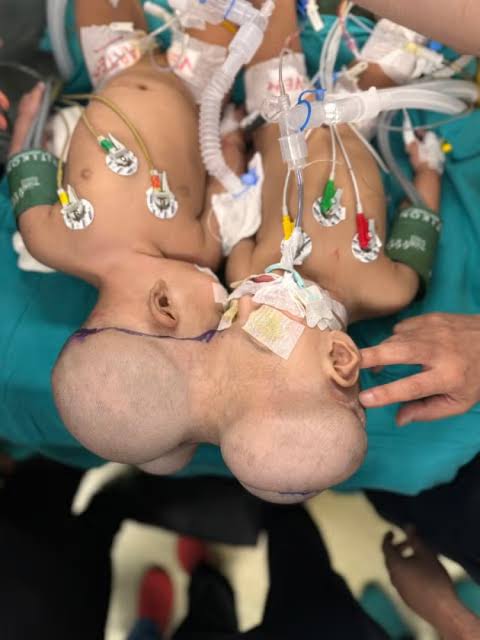Following a notable outcome, a London surgeon has expressed his overwhelming joy after successfully separating one-year-old conjoined twin girls in a challenging 14-hour operation.
Professor Noor ul Owase Jeelani, a consultant paediatric neurosurgeon at Great Ormond Street Hospital, completed the intricate procedure in Turkey, as reported by Evening Standard on Wednesday.
The conjoined twins, Minal and Mirha, born in Pakistan and joined at the head as craniopagus twins, are now recovering and expected to make full recoveries.
They shared vital blood vessels and brain tissue, requiring extremely delicate surgery.
Jeelani, who led the operation through his charity, Gemini Untwined, described the moment as “a really wonderful feeling” as the twins’ parents watched their daughters start a new chapter in life.
He said, “It was so rewarding to see two healthy children and the joy on their parents’ faces,” Jeelani told the Evening Standard, adding, “a really wonderful feeling.”
The complex surgery carried out at Ankara Bilkent City Hospital, spanned over three months and involved advanced techniques, including mixed reality (MR) technology, to separate the twins’ shared brain tissue and blood vessels.
“We used special goggles to view images of the brain and blood vessels superimposed onto the child’s head during surgery,” Jeelani explained, crediting the technology for its precision and potential to revolutionise surgical planning.
The case was referred to Jeelani’s team in 2023, and with support from Gemini Untwined and the Turkish government, the twins were transported from Pakistan for the life-saving operation.
Reflecting on the achievement, Jeelani praised the collaboration, saying, “Against the odds, we managed to pull it off.”
Conjoined twins are rare, occurring in one in every 2.5 million births, with a high mortality rate. Jeelani’s expertise is internationally recognised, having successfully separated other conjoined twins in Brazil, Israel, and Pakistan.
Though this operation wasn’t performed in the UK, Jeelani emphasised the excellence of British medicine: “We are world leaders in delivering this kind of complex surgery.”
Return to Pakistan?
Minal and Mirha were born with a rare prenatal condition, leading to their conjoined state, sharing critical blood vessels. “They’re making an excellent recovery, really wonderful,” Jeelani told Sky News.
“They should be in a position to go back to Pakistan in a few weeks,” he stated.
Minal and Mirha after separation on bed
Conjoined twins, Minal and Mirha, after separation in bed
The charity Gemini Untwined, founded by Jeelani, focuses on improving surgery and treatment for craniopagus children and those with complex craniofacial conditions.
“We had already operated on two Turkish boys in 2020, so we approached the Turkish government with a similar request,” Jeelani said. “They came back a week later with a positive response. It was logistically complex arranging the children to get to Turkey from Pakistan and to get our team over from the UK, but it went really well and the Turkish team was fantastic.”
MR Technology, 3D impact
The surgery was aided by mixed reality (MR) technology, which combines 3D images with real-world surroundings to enhance precision.
“For the surgery, we used special goggles that can give you images of the brain, blood vessels, or any other part of the anatomy that you want. Then you can position it and superimpose it on a child’s head during the procedure.
Minal and Mirha
Surgeons demonstrate with Mixed Reality, 3D Technology
“The technology helps to give you that assurance that your surgical planning has been correct. Sometimes it can show me something that I haven’t seen. Within the next five years, I can see mixed reality being used in more routine surgery. Hopefully, we can encourage young engineers and surgeons to further develop it,” Jeelani explained.
Conjoined twins account for only one in every 60,000 births, and only 5 per cent are craniopagus.
According to Gemini figures, the life expectancy of twins who remain conjoined is low, with about 40 per cent being stillborn or dying during labour.
Conjoined twins
Conjoined twins are a rare phenomenon resulting from the incomplete separation of a single fertilised egg during early development.
The degree of confluence between the twins can vary, from partial connections of the chest or abdomen to more complex merges involving the heart, liver, or other vital organs.
Despite the medical and surgical challenges they often face, conjoined twins demonstrate remarkable resilience and a unique bond, navigating life together with extraordinary adaptation and shared experiences.
The operation at Ankara Bilkent City Hospital was completed in two surgical stages over three months, with the final procedure lasting 14 hours.
Punch






Leave a Reply